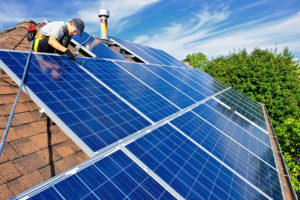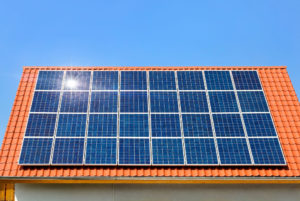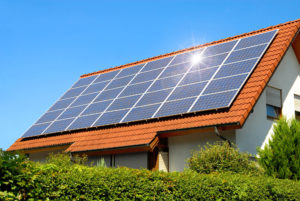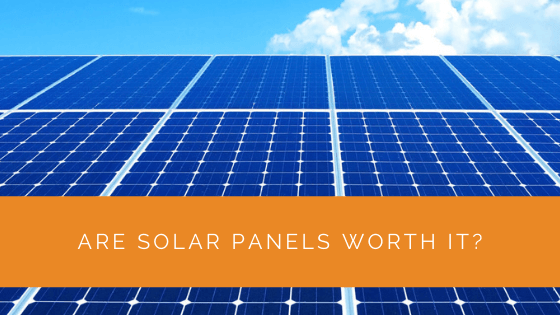Solar panels have become very popular recently, and their trend only grows daily.
If you are wondering about installing solar panels in your house, you may have many questions and queries. Are solar panels worth it? How much do solar panels save? Are they a good investment?
Solar panels may not provide a quick fix for increasing savings. However, they reap significant financial benefits from a long-term perspective. They are worth it only if you stay in the same house long enough and your household generates enough electricity.
Additionally, solar panels can even increase the value of your property. This alternative energy system also helps you cut down your carbon footprint. Besides owing to the ever-increasing demand for cleaner energy, installing solar panels can attract more incentives from local governments.
This article will give you a financial picture of investing in solar panels. So, keep reading to find out if it is worth your money!
Contents
- 1 Key Takeaways
- 2 How is Solar Energy Used to Power Homes?
- 3 Costs Involved in Powering Your Home Using Solar Panels
- 4 Solar Panels Pay for Themselves
- 5 Financial Benefits of Going Solar
- 6 Information for Solar Energy Installation
- 7 Solar Panels and Property Value
- 8 Most Efficient Solar Panels
- 9 Prices and Returns on Solar Power
- 10 Exporting Electricity
- 11 Case Study: Long-Term Benefits of Solar Panels for a Residential Property
- 12 Expert Insights From Our Solar Panel Installers About Solar Panel Worth
- 13 Discover the Power of Solar with Solar Panels Network
- 14 Final Takeaway
Key Takeaways
- Solar panels are worth considering if you plan to stay in your house long-term and generate enough electricity, as they offer significant financial benefits over time.
- Solar panels can increase the value of your property and attract incentives from local governments due to the growing demand for cleaner energy.
- While the initial cost of solar panel installation may seem high, they can pay for themselves in the long run through electricity bill savings and other financial benefits, making them a viable and eco-friendly investment.
How is Solar Energy Used to Power Homes?
A solar photovoltaic (PV) system converts sunlight into electricity. Solar panels installed on your roof trap the sunlight falling over your house and convert it to electricity. Then, you can use this electricity to power appliances in your home directly.
Additionally, you can use a battery to store the electricity to use it at night or when it is not sunny enough for electricity generation.
This technology has been around since the mid-1900s. However, it has only recently become a viable option for everyone.
Solar panels are quoted in terms of their electrical output potential. This theoretical electrical output is measured in watts. A 3 kWh (kilowatt-hour) household solar panel system can produce 3 kWh x 24 hours per day x 365 days per year.
This equals about 3,942 kWh annually when you factor in a 15% capacity factor. The capacity factor is the difference between the actual and theoretical outputs. Generally, it can vary anywhere between 15% to 30%.
Costs Involved in Powering Your Home Using Solar Panels
Solar power requires a higher level of capital intensity. This means that you will have to spend more money initially on equipment.
Purchasing solar panels and other required elements can seem expensive. The solar modules will make up most of the overall expense. Additionally, you will have to invest in inverters for household appliances, wiring gears, cables, and metering equipment.
Installation and Maintenance Cost
In addition to the equipment cost, you must include the installation cost while calculating the overall price. The price can vary widely depending on the size of the solar power system. Plus, it can vary depending on where you live.
Although solar power systems do not require you to spend a lot on maintenance, you still have to consider it. You will have to spend on maintaining a PV solar array. Additionally, batteries and inverters require regular replacements after a few years of usage.
If you do not want to clean the panels, you may have to pay for a cleaning service.

Is It Really Expensive?
Many people assume that solar panels are expensive and stay away from them. However, to assess their feasibility, you must factor in all the aspects, including their long-term benefits. Solar panels are not very expensive overall due to the money they can help you save in the long run.
The prices of solar panels are coming down with every passing day. For instance, if you compare the price of solar panels from 20 years ago with the current price, you can notice a huge difference.
Solar Panels Pay for Themselves
Yes! Solar Panels can pay for themselves later in their years. The average payback period in the UK is between 15 to 25 years. However, it can vary widely from one region to another.
The solar payback period is similar to the payback periods of any other investment. It is the estimated time before the investor ‘breaks even’ on the solar energy investment. The payback period is denoted as a percentage of ROI (Return on Investment).
Many factors affect the payback period. It includes the amount of electricity you use, the location of your house, and the money you receive under the smart export guarantee.
Calculating the Solar Payback Period
You can calculate the solar payback period using the cost of solar panels, the money you save on electricity bills, and net incentives.
For example, if the solar panel system you install in your house has a payback period of 10 years, you can save enough on your electricity bills to cover the cost of 10 years. You will see the real benefits after ten years.
Besides, the savings will be massive when you use the system for over two decades. The solar power system saves up to tens of thousands of pounds.
Factors Affecting the Payback Period
As mentioned earlier, Many factors affect your solar power system’s payback period. Some of them are listed below:
- Cost of the system (including panels, inverters, and batteries)
- Energy production in your house by the solar power system
- Cost of electricity in your location
- Average use of electricity in your home
- Incentives by the Government
Financial Benefits of Going Solar
Installing a solar energy system is becoming increasingly affordable these days. Besides, governments worldwide are encouraging people to switch to this eco-friendly powering method. So, it’s no surprise that it comes with many financial benefits.
Below are a few ways these systems can benefit you financially:
1. Electricity Bill Savings
Solar panel systems can cut a great deal when paying electricity deals. You can save on the cost of electricity, which is on the rise with every passing year. Further, installing solar panels can make your house self-sufficient during tough times.
2. Tax Deductions
Solar panels can provide you with tax benefits from the Government. If you install solar panels on your roof, you will be eligible for up to a 5% tax reduction according to the UK’s latest VAT pricing system for energy-saving products.
3. Increases Property Value
Installing solar panels can potentially increase the financial value of your home. Owing to its long-term energy-saving benefits, it can increase the evaluation of your property. Other factors such as tax deductions, long-term value, and environmental benefits add to the property value.
4. Independence
Your house will depend less on the National Grid for electricity. So, you can enjoy electricity at cheaper rates than the rest. You can also invest in a battery storage system to reduce dependence on the grid.
5. Long-Term Value
Generally, solar panels can last for up to 20 to 25 years. The long-term benefits will mitigate the cost of instalments and other fees. For instance, you can save thousands of pounds on electricity bills over the years.
Treating your solar panel system properly and maintaining it regularly can last over 30 to 35 years. Besides, if you invest in a high-quality design, it can last for up to 40 years.

6. Solar Panel Systems Strengthen the Local Economy
Solar panels can not only save you money; they can save money for your community as well. Since traditional energy sources are not renewable, they cause considerable damage to the environment. Thus, investing in solar panels can reduce your dependence on the community’s traditional sources of electricity.
It opens employment opportunities for installers, manufacturers, and designers. Further, it contributes towards a greener and cleaner community.
Information for Solar Energy Installation
Solar panels for a house of average size can cost around £6,000. So, here is some important information you should know before you commit.
Houses in Cloudy Britain Can Use Solar Panels
Contrary to popular belief, solar panels are not advantageous only in sunny areas. Solar panels harness daylight and not only sunshine. So, it can generate electricity in gloomy regions, too.
The panels work in the same way in Britain as in any other part of the world. Although more sunshine can generate more energy, you can still use panels to power your house.
Permission for Panels
You do not need any planning permission for solar panels. However, you must check with local authorities if your house is in a conservation area. You may also have to check with the local council if you have a flat roof.
A South-Facing Roof
To maximise the energy production of your panels, it would be best if the roof is facing the South direction. If the roof faces west or southwest, it can still be fine. However, other directions may not get the required savings.
The roof should remain unshaded for a few hours between 10 a.m. and 4 p.m. Also, the shading of trees or other buildings is fine.
Where Do You Live?
The further south you live, the more energy you can reap using solar panels. While you can still use solar panels effectively in northern regions, you can maximise the efficiency in the South of the UK. This is because the south receives more direct sunlight.
For instance, you can save anywhere between £100 to £240 in London. Whereas, if you live in Manchester, you can save about £95 to £230.
Solar Panels and Property Value
As mentioned earlier, the installation of solar panels can increase property value. However, in some cases, the panels can push the value down. It is possible because some people may consider the panels plastered on the roof unappealing to the eyes.
Furthermore, if you plan to move in a few years, it would be best not to invest in solar panels. The panels require you to pay a hefty amount, so moving after investing does not make sense economically.
If you want to ensure they impact the property’s value, you must ensure the panels employ the latest technology. Plus, they should be aesthetically pleasing and show significant energy-saving solutions. Therefore, steer away from old technology panels.
Besides, you must maintain the panels properly to not turn them into a liability for yourself or the new owners. Hence, take time out to maintain the solar panel system periodically.
Quick Tips for Solar Panel Maintenance
Here’s how you can take care of them to ensure the impacts of solar panels are positive on your property value:
- Document the performance: Note down the performance of the panels daily or weekly. With this data, you can see if the results are inconsistent and contact your manufacturer if necessary.
- Keep the shade away: Energy production can become inefficient over time if the panels have too much shade. Therefore, keep the solar panels away from shade.
- Use a monitoring system: This can help you track the panel’s performance and environmental impact. So, install systems that can tell you and the prospective home-buyers how much money they can save on electricity bills.
- Check the inverter regularly: If there are no flashing green lights on the inverter, the panels are not contributing towards saving money.
- Clean the panels regularly: Solar panels need cleaning, although this time varies depending on the model. Besides, the dirt on the panels can hinder its performance. You can contact your manufacturer for advice on cleaning your panels.
- Professional Servicing: Depending on the model, the panels may require servicing once a year or a decade. During a professional service, the installer will conduct several tests on the panels, inverters and meter. Plus, regular servicing will ensure your solar energy system runs smoothly.
Most Efficient Solar Panels
You can ensure good ROI only if you invest in the correct type of panels. These panels are available in various types. These are two of the most efficient types of solar panels: Photovoltaic Cells and Thermal.
The photovoltaic cells are people’s most common panels to power their home appliances. On the other hand, the thermal panels can also help you heat water. Furthermore, incentives are focused on photovoltaic cell panels.

Prices and Returns on Solar Power
Solar PV systems can cost anywhere from £1400 to £1750 for installed capacity. The precise amount will vary depending on the house’s size and the system’s complexity. The mounting system, cable length, and roof access also affect the total cost.
An optimal south-facing solar panel system can generate up to 985kWh per kWp. The MCS calculator for solar panels calculates this reading on a roof with a of slope 30 degrees.
The size of the system also impacts the Investment Rate of Return. The larger the system, the higher the IRR. For instance, the IRR for a system size of 30 kW can generate annual electricity of up to 25,968 kWh. This can save up to £3000, meaning the IRR is 14%.
At the same time, a system size of 50 kW can give up to 16% IRR. It will generate 42,993 kWh annually and save up to £4,955.
Exporting Electricity
Once the system is installed, every unit of electricity the panels generate is free.
The average peak electricity cost in the country is currently 16p per unit. It is expected to rise to 30p per unit on average over the next two decades. Thus, this is the best time to invest in your home’s solar power generation system.
Generally, you can use 50% to 70% of the solar panel system’s energy. You can use numerous assistive technologies like automated devices to maximise electricity. You can even export the energy into the national energy grid.
The Government launched a new scheme that will pay households that install solar panels in January 2020. This scheme is called SEG (Smart Export Guarantee).
You may be eligible for SEG if you have solar PV on your roof and meet their criteria. Under this scheme, electricity suppliers will pay small-scale generators for their electricity using low-carbon methods to the National Grid.
To qualify to receive payments from energy suppliers under this scheme, you will need the following:
- MCS (Microgeneration Certification Scheme) certificate
- A smart meter (SMETS 2 meters or certain SMETS 1 meters) that can track the amount of electricity export (the meter should send the data to the supplier every half hour)
- Solar panels with capacity less than or equal to 5MW
Case Study: Long-Term Benefits of Solar Panels for a Residential Property
Background
At Solar Panels Network, we pride ourselves on delivering top-notch solar energy solutions across the UK. Our commitment is to provide sustainable, cost-effective, and efficient solar power systems tailored to meet our customers’ unique needs. This case study explores a recent residential project where we installed a comprehensive solar panel system, demonstrating the long-term benefits and financial savings achieved.
Project Overview
The project involved a medium-sized residential property located in Southern England. The homeowners were environmentally conscious and sought to reduce their carbon footprint while cutting down on their monthly electricity bills. After an initial consultation and site survey, we proposed a 4 kW solar photovoltaic (PV) system to meet their energy needs.
Implementation
- Installation Process: We installed high-efficiency photovoltaic panels on the south-facing roof of the property, ensuring maximum exposure to sunlight. The installation included modern inverters and a battery storage system to optimise energy use and storage.
- Technical Specifications: The system comprised 16 panels, each with a capacity of 250 watts. We used advanced micro-inverters to enhance the system’s efficiency, even in partially shaded conditions. The battery storage system allowed the homeowners to store excess energy generated during the day for use during the night or cloudy days.
- Maintenance Plan: To ensure the system’s longevity and optimal performance, we provided a detailed maintenance plan. This included regular cleaning of the panels, annual checks of the inverters and battery storage, and monitoring software to track the system’s performance in real-time.
Results
- Financial Savings: Within the first year, the homeowners reported a significant reduction in their electricity bills, saving approximately £600 annually. The savings are projected to increase as electricity prices rise.
- Environmental Impact: The solar panel system has reduced the household’s carbon footprint by approximately 1.5 tonnes of CO2 annually. This reduction contributes to the UK’s broader goals of reducing greenhouse gas emissions and promoting renewable energy sources.
- Property Value Increase: The installation of the solar panel system has also increased the property’s market value. Potential buyers are attracted to the long-term savings and environmental benefits offered by the solar energy system, making the property more appealing in the real estate market.
- Government Incentives: The homeowners benefited from government incentives, including the Smart Export Guarantee (SEG), which provided additional income for the excess energy exported back to the National Grid. This incentive further improved the return on investment for the solar panel system.
Summary
This case study exemplifies how investing in a solar panel system can yield substantial financial and environmental benefits. By partnering with Solar Panels Network, the homeowners achieved significant savings on their electricity bills, reduced their carbon footprint, and increased their property’s value. Our commitment to quality installations and ongoing support ensures that our customers maximise the benefits of their solar energy systems.
Expert Insights From Our Solar Panel Installers About Solar Panel Worth
If you’re considering solar panels, it’s essential to look beyond the initial investment. Think of it as a long-term financial plan that not only reduces your electricity bills but also boosts your property’s value and supports a cleaner environment.
Senior Solar Installer
Solar panels are more than just a financial investment; they are a commitment to sustainable living. With proper maintenance, the system can last over 25 years, ensuring significant savings and reduced carbon footprint over time.
Lead Installation Technician
From my experience, solar panels pay for themselves within a reasonable period, especially with government incentives and rising electricity costs. It’s an investment that offers both economic and environmental returns.
Chief Installation Officer
Discover the Power of Solar with Solar Panels Network
Are you navigating the world of solar installations? Look no further than Solar Panels Network, the UK’s trusted partner in harnessing the sun’s potential. Our dedication goes beyond just installations; we’re on a mission to transform how homeowners and businesses across the UK perceive and utilise energy. By choosing us, you’re reducing your carbon footprint and making a smart financial move that promises savings for years ahead. Contact us today and embark on your solar journey.
Final Takeaway
A solar panel system is an excellent investment for your home. It comes with a substantial long-term benefit for individuals and the community. No wonder it is becoming so popular these days!
Although the instalment costs are high, the overall advantages make it more feasible for modern homeowners. Besides, the panel will pay for themselves in a few years.
The advantages do not end there. Solar panels make your house more independent, increase property value, and last decades.
It is rather profitable as long as you have plans to stay in the same house for a long time. Additionally, it will allow you to play your part in making the planet cleaner and greener.
About the Author
Solar Panels Network stands at the forefront of solar energy solutions, driven by a team of seasoned solar engineers and energy consultants. With over decades of experience in delivering high-quality solar installations and maintenance, we are committed to promoting sustainable energy through customer-centric, tailored solutions. Our articles reflect this commitment, crafted collaboratively by experts to provide accurate, up-to-date insights into solar technology, ensuring our readers are well-informed and empowered in their solar energy decisions.

